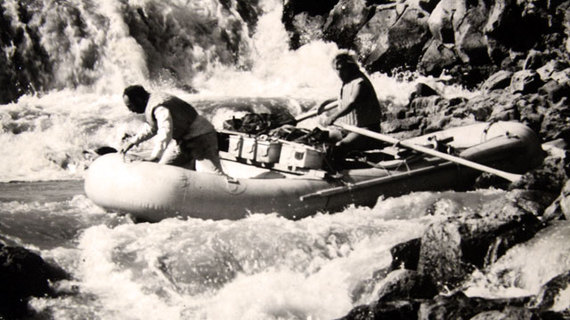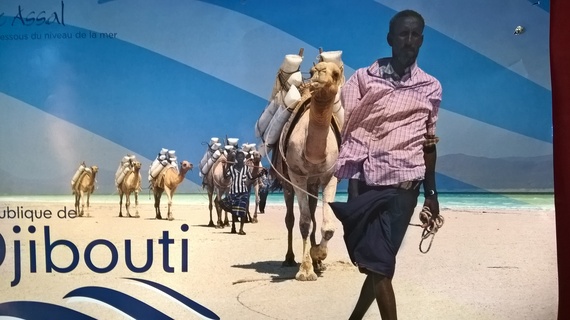Richard Bangs is a judge in our We Said Go Travel Writing Contest. The Gratitude contest will close December 10, 2015. Please share your story of gratitude!
When our rafts were bitten by crocodiles or hippos, complications presented we hadn’t imagined.
We were in Ethiopia making a series of first descents down big rivers that fall off the Abyssinian Plateau: The Omo, Baro, Blue Nile, and the Awash. We called our little expedition Sobek, after the ancient Egyptian crocodile god, hoping the homage would ensure safe passage. But, another challenge reared its head, one unanticipated. When we entered the country, we discovered the customs authorities wanted us to either pay an outrageous duty (150 percent of the cost of the rafts), or prove we exported them after our trips.
They stamped our passports with a notice that conveyed such, and unless we had our passports stamped again with proof of export, we would be assessed and fined, maybe even jailed.

So, when we kept losing our inflatable boats to the jaws of riverine beasts, we needed a plan. It was too expensive to ship shredded rafts back to the U.S. But then Jim Slade, our senior guide, had an ingenious idea. For just a few dollars, we could put the damaged rafts on the train to Djibouti, and have our passports duly stamped as having exported the goods. We didn’t know anyone in what was then The French Territory of the Afars and Issas, so we made up a recipient, Pierre DuPont, and off the torn boats went up the Horn of Africa, never to be heard of again.
The first river we negotiated in Africa was the Awash, starting near Addis Ababa and pouring through severe gorges, over waterfalls, burrowing underground at some points, and emptying into the Danakil Depression, the lowest plug in Africa. Its terminus is a lake with no out outlet, Lake Abbe, which spreads its alkaline waters into Djibouti. Its landscape is so phantasmagoric it was featured in Planet of the Apes. On the final days of our raft descent of the Awash, we fell behind schedule for an arranged air pick-up, so we pulled out at an agricultural station called Gewani. We were just short of Lake Abbe, our expedition left incomplete.
For years I’ve been haunted by these two episodes. What happened to our rafts? What is at the finale of the Awash River.
Finally, I have the chance.
The triggering event is the opening of a direct flight to Djibouti on Qatar Airways. I could fly from LAX (or several other major U.S. cities) non-stop to Doha; wait a couple hours in perhaps the most luxurious airport lounge in the world, and then connect to Djibouti.
I call my friend Scott Siegler, a former studio head who would rather trek into the heart of darkness than date an actress, and he’s on board. So, after a smooth ride to the Arabian Peninsula, and then across it (I’ve decided my favorite hotel in the world is Qatar Airways… always a good night sleep in their flat beds), we make a quick transfer to the Sheraton Hotel, right on the glimmery waters of the Gulf of Aden, and after a freshly-squeezed juice, and a swim in the naturally warm pool, we’re ready to shatter the glass of Western gentility. The timing seems good. The London Telegraphearlier this year named Djibouti “Africa’s Hottest New Travel Destination.”
Still, when I mentioned to friends and family I was heading to Djibouti I got two responses: 1) Where the #!@* is Djibouti; or, 2) Why? Isn’t that the middle of the Hot Zone?
On our second night in the country, we have dinner with the U.S Ambassador, Tom Kelly, at the Café de la Gare, the best restaurant in Djibouti.
The Ambassador is unequivocal: “This is the safest city in Africa.” He points out that Djibouti is the only country in the continent never involved in a war. It is, of course, a strategic location, a sort of backdoor to the universal truths of the region, and as such hosts a lot of military. There is a major U.S base (largest in Africa) with some 4500 Americans. There is a German base; a French base; a Japanese base; Italian; Spanish and others. Seal Team Six is based here. The Chinese are a major economic presence, and are building a new port, new roads; a new railroad; and a major resort on The Red Sea to service Saudis and other high-end tourists.
READ THE FULL ARTICLE on Huffington Post
There is only one U.S.-based travel company offering customized tours to Djibouti: MTSobek
If you’d like to paddle and swim with the Whale Sharks, or take an adventure organized and run by a local outfitter, contact Rushing Waters Adventures

